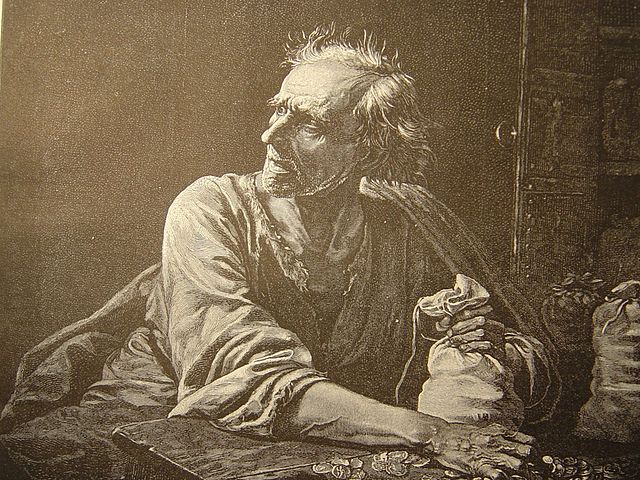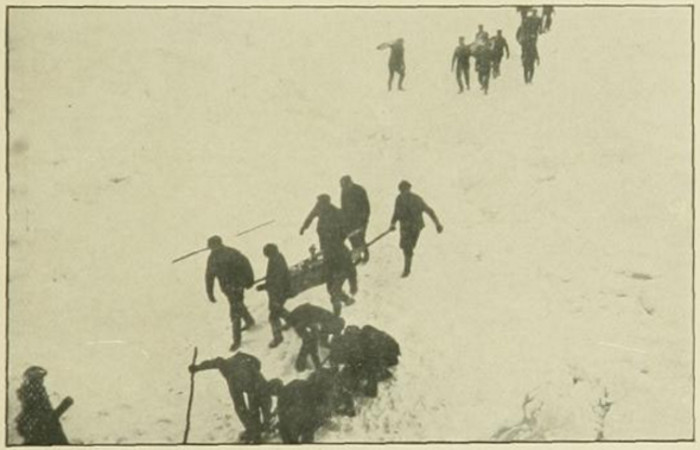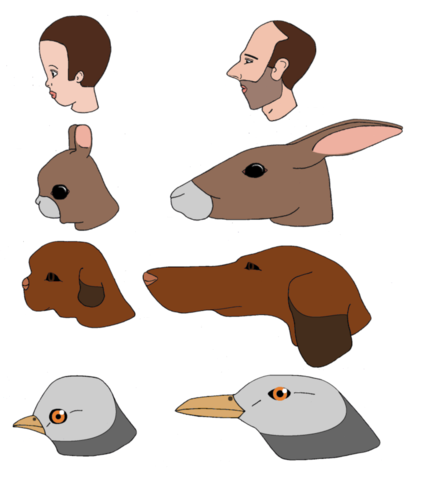
philargyry
n. love of money
pismirism
n. hoarding of money; miserliness
ingordigious
adj. greedy, avaricious
pleonectic
adj. excessively covetous, avaricious, or greedy

philargyry
n. love of money
pismirism
n. hoarding of money; miserliness
ingordigious
adj. greedy, avaricious
pleonectic
adj. excessively covetous, avaricious, or greedy

In 1914, 132 sealers found themselves stranded on a North Atlantic icefield as a bitter blizzard approached. Thinly dressed and with little food, they faced a harrowing night on the ice. In this week’s episode of the Futility Closet podcast we’ll tell the story of the Newfoundland sealing disaster, one of the most dramatic chapters in Canadian maritime history.
We’ll also meet another battlefield dog and puzzle over a rejected necklace.

“Humans feel affection for animals with juvenile features,” noted Konrad Lorenz. “Large eyes, bulging craniums, retreating chins. Small-eyed, long-snouted animals do not elicit the same response.”
This induces people to care for small, cuddly animals. “And this has led some experts to argue that the entire phenomenon of pet-keeping is nothing more nor less than an elaborate case of social parasitism,” writes zoologist James Serpell. “Needless to say, this idea has done little to promote a positive view of pets or their owners. Rather, it creates the impression that pet-owners are the victims of some kind of bizarre affliction, and that dogs, cats and budgerigars are little different from body lice, fleas or tapeworms or, indeed, any other sort of parasitic organism.”
(From James Serpell, In the Company of Animals, 1986.)

In German East Africa during World War I, soldiers painted this pony to resemble one of the local zebras so it could be tethered in the open.
The Imperial War Museum adds, “Two white ponies behind anxiously await their makeovers.”
The job of creating voices for Munchkins and Winkies in The Wizard of Oz fell to vocal arranger Ken Darby. “In those days we didn’t have the technical facilities we have now, like speeding up tape,” he said. “I had to figure out how to make the Munchkins sound high-pitched”:
I worked it out mathematically, using a metronome. Then I went to the head of the sound department, Doug Shearer. I told him that if we could record at sixty feet per minute instead of the normal ninety feet per minute and if we sang at a slower pace in a different key, when we played it back at ninety it should sound right. He said there was no way to do that because we didn’t have a variable-speed recorder. Then he said he would try to manufacture a new gear for the sound-recording machine. And it worked. I had the singers sing very slowly and distinctly so the words would be clear when we played it back at a faster speed. Ding … Dong … the … witch … is … dead. When we played it back, it was a perfect one-fourth higher.
“None of the midgets did any of the singing. None of them could carry a tune.”
(From Aljean Harmetz, The Making of The Wizard of Oz, 1977.)

“Everyone believes in the normal law, the experimenters because they imagine that it is a mathematical theorem, and the mathematicians because they think it is an experimental fact.” — Gabriel Lippmann
(Thanks, Tom.)

The guillotine was originally offered as a humane method of execution — but rumors circulated that a sudden, clean decapitation did not always kill the prisoner. In 1905 a Dr. Beaurieux examined the just-removed head of Henri Languille:
I called in a strong, sharp voice: ‘Languille!’ I saw the eyelids slowly lift up, without any spasmodic contractions — I insist advisedly on this peculiarity — but with an even movement, quite distinct and normal, such as happens in everyday life, with people awakened or torn from their thoughts.
Next Languille’s eyes very definitely fixed themselves on mine and the pupils focused themselves. I was not, then, dealing with the sort of vague dull look without any expression that can be observed any day in dying people to whom one speaks. I was dealing with undeniably living eyes which were looking at me. After several seconds, the eyelids closed again. … It was at that point that I called out again and, once more, without any spasm, slowly, the eyelids lifted and undeniably living eyes fixed themselves on mine with perhaps even more penetration than the first time. Then there was a further closing of the eyelids, but now less complete. I attempted the effect of a third call; there was no further movement — and the eyes took on the glazed look which they have in the dead.
Perhaps hanging is easier. From the Quarterly Review, September 1849, quoted in Notes and Queries, July 4, 1874:
An immense number of persons recovered from insensibility have recorded their sensations, and agree in the report that an easier end [than hanging] could not be desired. An acquaintance of Lord Bacon, who meant to hang himself partially, lost his footing, and was cut down at the last extremity, having nearly paid for his curiosity with his life. He declared that he felt no pain, and his only sensation was of fire before his eyes, which changed first to black and then to sky-blue. These colours are even a source of pleasure. A Captain Montagnac, who was hanged in France during the religious wars, and rescued from the gibbet at the intercession of Viscount Turenne, complained that, having lost all pain in an instant, he had been taken from a light of which the charm defied description. Another criminal, who escaped by the breaking of the cord, said that, after a second of suffering, a fire appeared, and across it the most beautiful avenue of trees. Henry IV. of France sent his physician to question him, and when mention was made of a pardon, the man answered coldly that it was not worth the asking.
Daniel Rozin makes interactive digital artworks that respond to the presence of the viewer, in many cases serving as mechanical or digital mirrors.
“In an interactive piece such as my Mirrors or Easel, the piece has no content without the viewer and the piece celebrates the likeness of the viewer,” he says. “This suggests that the important part of this equation is the person, not the artifact.”
(Thanks, Seth.)

This is floating on the web — I don’t know who came up with it:
The geographical center of Boston is in Roxbury. Due north of the center is the South End. This is not to be confused with South Boston, which lies directly east from the South End. North of the South End is East Boston, and southwest of East Boston is the North End.
“We say the cows laid out Boston,” wrote Emerson. “Well, there are worse surveyors.”
Hawaiian artist Sean Yoro paints murals positioned near or in large bodies of water. He paints on the sides of shipwrecks, abandoned docks, and submerged walls, often on themes of climate change and rising sea levels, balancing on a paddleboard and using environmentally friendly materials.
“Combining both my art and environmental passions happened almost by accident at first, when I started creating murals along ocean walls,” he told the Met. “I always had underlying messages of sustainability and awareness, but this was the first concept I could literally combine these two aspects of my life influences into one. Every project since then has seamlessly integrated both values into their own unique stories naturally.”